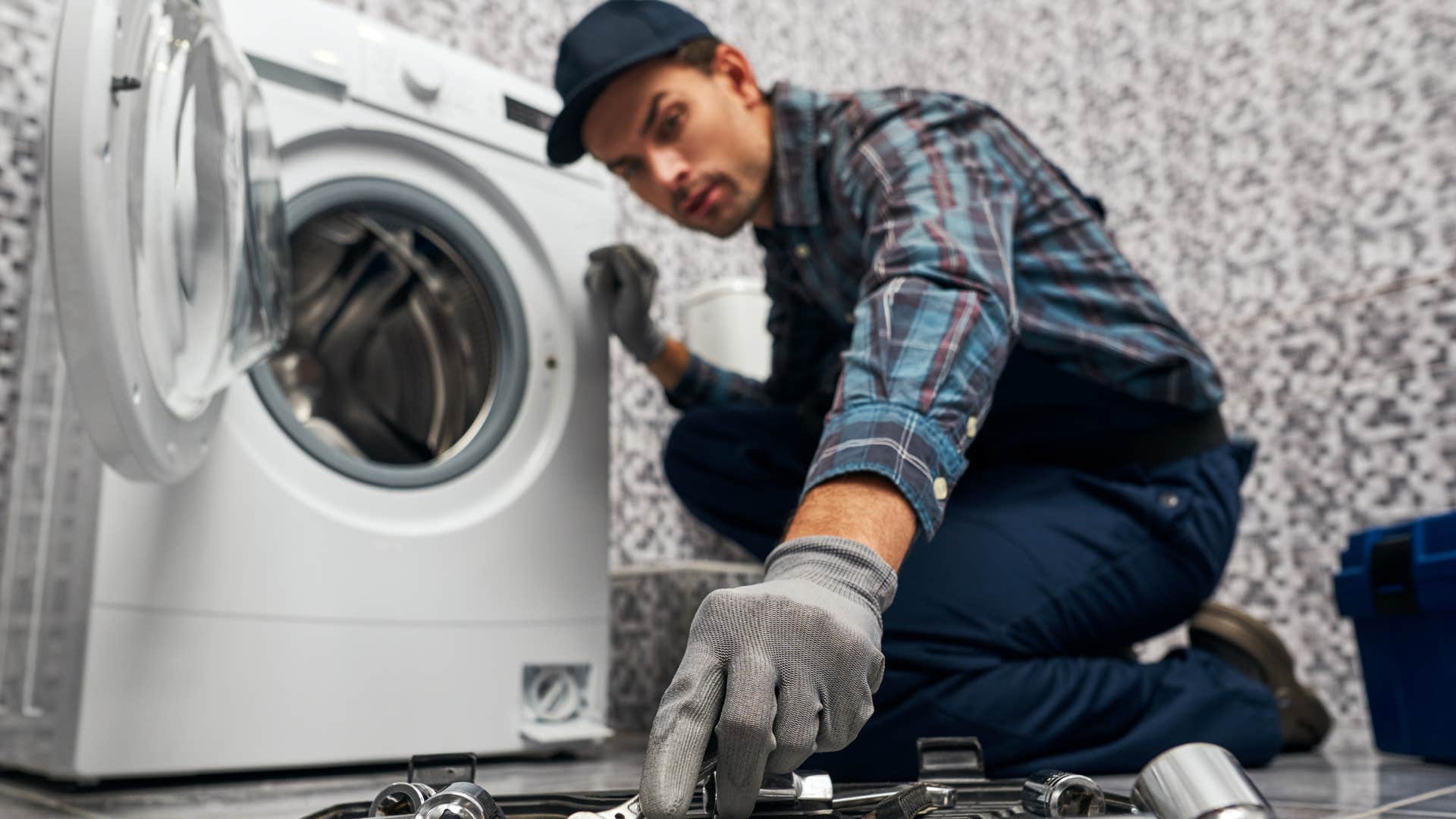If Someone Grew Up Lower Middle Class, They’ll Do These 11 Things Without Realizing
People who do these things are often stuck in survival mode.
 Luis Molinero / Shutterstock
Luis Molinero / Shutterstock The true middle class has shrunk in recent years. While many people still classified as “middle class” are experiencing a slight shift in incomes, others are being pushed into poverty by basic expenses like childcare, groceries, and rent, as well as other unexpected financial strains, such as healthcare emergencies. However, for people who grew up teetering on the line between middle class and low-income, they’ve likely internalized the struggle in ways that pop up in their daily habits and rituals.
If someone grew up lower-middle-class, they’ll do these things without realizing it, whether it’s saving for a rainy day, conserving random resources in their routines, or helping their neighbors. They’re far more conscious of spending and money than their wealthier counterparts.
If someone grew up lower-middle-class, they’ll do these 11 things without realizing
1. Check their bank account before paying
 Elizaveta Elesina | Shutterstock.com
Elizaveta Elesina | Shutterstock.com
For people who grew up in or still grapple with a state of financial insecurity, checking their bank account is second nature. They’re always operating from a place of anxiety, unsure of how they’re going to afford basic necessities or pay their bills. Every time they pay for something, checking their bank account first is instinctive.
That’s part of the reason why these people also opt out of auto-pay options for things like regular bills, while other people with more financial stability use it for convenience. They have to plan, prep, and make compromises every single month to ensure they have the money they need to survive.
2. Stretch meals
 Antonio Suarez Vega | Shutterstock.com
Antonio Suarez Vega | Shutterstock.com
According to a study published in the Journal of Nutrition Education and Behavior, caretakers and parents living in financial insecurity are often highly skilled at stretching their meals because they have no other choice. If they don’t have the money to go out for dinner, pick up a meal, or go out for groceries, making do with what they have is their only option.
So, if you grew up lower-middle-class, chances are you’ll do this without realizing. Even if you do have the money for groceries, you’ve grown into the habit of stretching meals and holding off on making food purchases for as long as you can.
3. Hoard freebies
 Fizkes | Shutterstock.com
Fizkes | Shutterstock.com
Whether it’s toiletries from the hotel room or freebies from the grocery store, if someone grew up in a lower-middle-class household, they’ll do these things without realizing it. Anything that can save them a few dollars in the long run or on their next grocery trip is worth grabbing, even if it means they’re using single-use toiletries and tiny bottles of shampoo for months.
Of course, small changes and even freebies aren’t giving people living in low-income situations a leg up to live a better financial life, considering poverty is often rooted in cognitive changes and specific mindsets. However, it can be a small luxury that adds a bit of joy to their lives.
4. Fix things themselves
 Friends Stock | Shutterstock.com
Friends Stock | Shutterstock.com
Rather than hiring service workers or repairpeople to fix things like household repairs or appliances, lower-middle-class people do it without thinking twice. Even if it takes more time, energy, and education to do it themselves, they’re often forced to do it, without the money or financial stability to outsource.
Even when it comes to larger expenses like car repairs, they prefer to save money on service and labor costs by doing it in a “DIY” version.
5. Overapologize
 Anatoliy Karlyuk | Shutterstock.com
Anatoliy Karlyuk | Shutterstock.com
Like a study published in the Journal of Poverty suggests, struggling with money can often spark internalized shame that doesn’t simply go away once financial insecurity lessens. Whether it’s present in discomfort while talking about money or justifying spending habits to anyone who asks, if someone grew up lower-middle-class, they’ll often operate from a place of shame without realizing it.
Even if it’s overapologizing to people for asking for help, spending money, or not giving them the most expensive birthday present, this shame pops up in subtle and unsuspecting ways.
6. Choose stable jobs
 Stock 4You | Shutterstock.com
Stock 4You | Shutterstock.com
If someone grew up lower-middle-class, they’ll often choose stable jobs over creative or insecure ones without realizing it. Even if they have the opportunity to pursue something they’re passionate about, they’ll choose the financially secure one instead, afraid of the insecurity and instability they experienced earlier in life.
Considering many low-income children were parentified from a young age, forced to contribute to household earnings and help their parents financially, it’s not surprising that they hold onto those feelings of obligation as adults. They want stability and control because they didn’t have it as a child, so choosing a job for stability over passions seems like the only option for survival.
7. Avoid conversations about money
 Bricolage | Shutterstock.com
Bricolage | Shutterstock.com
Not talking about money doesn’t just sabotage stress levels and mental health. It often also isolates people in poverty from support and healthy relationships. However, if someone grew up lower-middle-class, they may avoid these conversations without realizing.
They feel a sense of internalized shame about their finances, even believing that they’re burdening others by being open about money and their struggles.
8. Choose practical gifts
 Chay_Tee | Shutterstock.com
Chay_Tee | Shutterstock.com
Rather than opting for the most expensive, new, or shiny gift, if someone grew up lower-middle-class, they’ll choose practical gifts time after time without realizing it.
Luckily, people do tend to be happier and more satisfied with practical gifts over surprises, so even if it’s a coping mechanism for financial struggles, it’s still an effective method of gift-giving.
9. Use coupons and loyalty programs
 Zamrznuti tonovi | Shutterstock.com
Zamrznuti tonovi | Shutterstock.com
Of course, many people of varying economic classes use coupons, loyalty programs, and sales to save money in their everyday lives. Still, for lower-middle-class people, it’s not always a choice. Whether it’s buying groceries or replacing a worn winter coat, they’re always looking for ways to save money, even if they have the financial freedom later in life to splurge.
They’re stuck in a survival mindset from their childhood, where things were always hard and they were forced to claw their way to fleeting comfort by making small sacrifices. Today, their couponing is a reflex — a way to protect themselves from uncertainty and instability, even if they don’t necessarily need it.
10. Use everything fully
 bbernard | Shutterstock.com
bbernard | Shutterstock.com
Whether it’s skin-care products they don’t like or a meal they’re not fond of, if someone grew up lower-middle-class, they’re conditioned to finish everything, even if they’re not a fan.
In their mind, wastefulness is more alarming than choice. You can not like something, but that doesn’t mean you should use it or eat it, because you spent money on buying it that you can’t get back.
11. Consider cost before accepting invitations
 Gorgev | Shutterstock.com
Gorgev | Shutterstock.com
If someone grew up lower-middle-class, they’ll do things like consider cost before accepting invitations instinctively. Whether it’s close friends or a community event, they’re thinking about money before they’re considering anything else.
Unfortunately, it’s often social support and connectedness that acts as a buffer against stress for people in financially uncertain situations. The more support, love, and community they have in their lives, the less anxiety, burden, and shame they internalize about their money struggles and financial problems.
So, even if it’s hard at times, prioritizing social connection without a hefty price tag is important, whether it’s hanging out with friends or going out to public spaces.
Zayda Slabbekoorn is a senior editorial strategist with a bachelor’s degree in social relations & policy and gender studies who focuses on psychology, relationships, self-help, and human interest stories.

